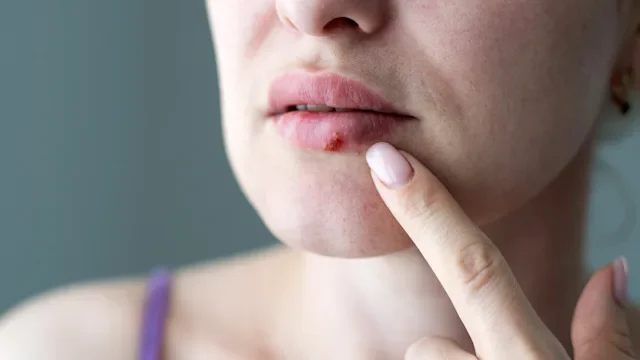Key takeaways:
Herpes esophagitis is a condition where herpes blisters and ulcers develop inside the esophagus, which is the tube that connects the mouth to the stomach.
Herpes blisters can also develop in the back of the throat. This is called herpes pharyngitis.
Antiviral medication can help blisters in the throat and esophagus heal faster.
The herpes simplex virus (HSV) causes painful blisters or sores in and around the mouth and the genitals.
Most people think of cold sores when they picture oral herpes. Herpes can cause blisters around the lips. But it can also cause ulcers inside the mouth, on the tongue and in the back of the throat. Herpes can also cause sores inside the esophagus (the tube that connects the mouth to the stomach).
Throat herpes can describe either herpes pharyngitis (herpes sores in the back of the throat) or herpes esophagitis (herpes sores in the esophagus). Throat herpes is painful and can make it difficult to eat and drink, which can lead to dehydration. People experiencing throat herpes often need treatment to help them stay hydrated and comfortable. Here’s what to know to expect if you’re experiencing throat herpes.
Search and compare options
How common is throat herpes?
Herpes pharyngitis and herpes esophagitis can both be considered throat herpes, but they are very different. Herpes pharyngitis is more common than herpes esophagitis.
Herpes pharyngitis
Herpes pharyngitis is common among both children and adults. People typically develop herpes pharyngitis the first time they have an oral herpes outbreak.
Usually, the first herpes outbreak is the most severe. During the first outbreak, people have more blisters and those blisters take longer to heal. People may experience blisters in and around their mouth, gums, tongue, and the back of their throat.
But future outbreaks are less severe. That means people don’t develop as many blisters and those blisters go away faster. Most people only develop cold sores around the mouth, if they develop any symptoms at all. Most people will not develop herpes pharyngitis more than once in their lifetime.
Herpes esophagitis
Herpes esophagitis tends to develop when people have a weakened immune system. You may have a weakened immune system if you:
Received a bone marrow or organ transplant
Take medications that lower your immune function, like chemotherapy, steroids, and immunosuppressants
Have a medical condition that can affect how well your immune system functions
- ValtrexValacyclovir
- ZoviraxAcyclovir
- FamciclovirGeneric Famvir
Herpes esophagitis can develop when you have an oral herpes outbreak. In these cases, the infection spreads from the mouth into the esophagus. Herpes esophagitis can also develop without oral herpes. This happens when the virus wakes up (“reactivates”) inside the vagus nerve, which connects to the esophagus.
It’s possible to develop herpes esophagitis if you don’t have a weakened immune system. But this isn’t common.
Tongue herpes: Herpes blisters can appear anywhere in or around the mouth, including the tongue. Here’s what tongue herpes looks and feels like.
Are cold sores contagious? You’re most likely to pass herpes to another person when you have a herpes blister. Here’s how long cold sores are contagious.
Herpes and kissing: Avoid kissing and sharing items that touch your mouth when you have a herpes blister. It’s not a myth — it’s possible to pass herpes through kissing.
What are the symptoms of herpes in the throat?
Common symptoms of throat herpes include:
Sore throat
Pain with swallowing
Trouble eating and drinking
You may also notice herpes sores or blisters on your lips, gums, and tongue. If you have herpes pharyngitis, you may be able to see the sores in the back of your throat if you say “ah” while looking in a mirror.
If you have herpes esophagitis, you may notice additional symptoms like:
Chest pain in the middle of your chest
Heartburn
Pain in your upper abdomen
How is herpes esophagitis diagnosed?
You can’t see herpes esophagitis on your own.
Herpes esophagitis is diagnosed with an upper endoscopy (EGD). During an upper endoscopy, a healthcare professional uses a small camera to look at the esophagus, stomach, and first part of the small intestine. Herpes esophagitis looks like small ulcers in the lower part of the esophagus.
A healthcare professional can take biopsies of the ulcers that can be tested for the HSV virus. Herpes esophagitis can be diagnosed if those tests are positive for the HSV virus.
How do you treat throat herpes?
Both types of throat herpes can heal without treatment. But it can take up to 10 days for throat herpes to go away on its own. It can take even longer if you have a weakened immune system.
During that time, people can experience a lot of pain. They may also stop eating and drinking because of pain. This can lead to dehydration. People may also stop taking their medications, which can lead to other health problems.
That’s why most people receive treatment for throat herpes. Antiviral treatment will speed up healing time for both herpes pharyngitis and herpes esophagitis. Antiviral treatment options include:
People who have dehydration or can’t eat or drink at home may need to be treated in a hospital. During that time, they can receive hydration, nutrition, and antiviral medication through a vein (intravenous). When the blisters start to heal, they can complete treatment at home with antiviral medications by mouth.
When should you get care for herpes in the throat?
It’s best to get care within 48 hours if you think you have throat herpes. Antiviral medications work best if they’re started within 48 hours of when symptoms or blisters first appear.
But get medical care immediately if you think you have throat herpes and you have a weakened immune system. Children and infants should also be seen by a medical professional right away. You should also get care urgently if you have symptoms of dehydration like:
extreme thirst
dizziness
confusion
exhaustion
dry, cracked skin
sunken eyes
dark urine
making less urine
The bottom line
Herpes in the throat can cause a sore throat and painful swallowing. Throat herpes makes it hard to eat and drink and can lead to dehydration You are at a higher risk of getting herpes in the esophagus if your immune system is weakened. Throat herpes can be treated with medication to make it go away faster. But you need to start medication within 48 hours of symptoms first appearing to fully benefit from the medication. Get immediate care if you have a weakened immune system and symptoms of throat herpes.

Why trust our experts?


References
Arnold, J. C., et al. (2018). Pharyngitis. Principles and Practice of Pediatric Infectious Diseases.
Généreau, T., et al. (1997). Herpes esophagitis: A comprehensive review. Clinical Microbiology and Infection.
Shah, R., et al. (2023). Herpes simplex virus esophagitis in an immunocompetent patient. Cureus.














